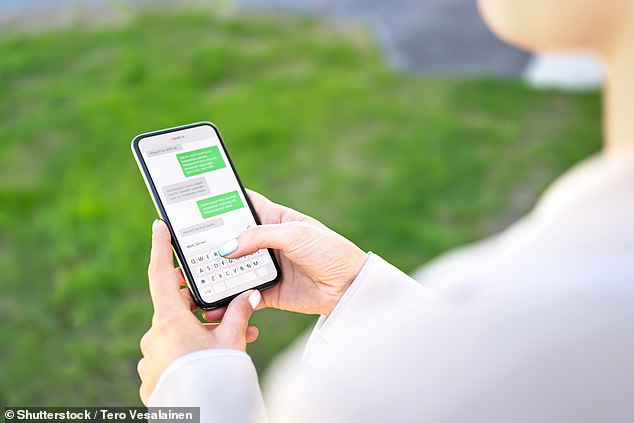The FBI has issued a warning to Americans about sending regular text messages between Androids and iPhones.
The agency revealed that exchanges between the two brands leave messages vulnerable to hackers.
Instead, users are advised to use secure, encrypted messaging and phone calls on apps like WhatsApp to prevent third parties from accessing conversations.
The warning comes as Chinese hackers have reportedly hacked several US networks that are ‘ongoing and likely larger in scale than previously understood.’
Dubbed Salt Typhoon, the cyberespionage campaign surfaced this year when hackers attacked networks of several telecommunications companies.
The hackers used their access to target the metadata of a large number of customers, including information on the dates, times and recipients of calls and texts.
They also succeeded in retrieving the actual audio files of calls and content from texts from a much smaller number of victims.
Despite months of investigation, the true scale of China‘s operation, including the total number of victims or whether the hackers still have some access to information, is currently unknown.

FBI warns iPhone and Android users to use end-to-end encryption to text each other amid hackers accessing their content
Jeff Greene, CISA’s executive assistant director for cybersecurity, issued the stark warning Tuesday, urging Americans to be vigilant amid the hacking campaign.
He told Politico that people should ‘use your encrypted communications where you have it,’ adding that ‘we definitely need to do that, kind of look at what it means long-term, how we secure our networks.’
Encrypted apps protect user’s data by transforming their phone calls and text messages into an unreadable format to prevent dangerous parties from gaining unauthorized access.
‘Our suggestion, what we have told folks internally, is not new here: encryption is your friend, whether it’s on text messaging or if you have the capacity to use encrypted voice communication,’ Greene told NBC News.
‘Even if the adversary is able to intercept the data, if it is encrypted, it will make it impossible.’
Several recent high-profile hacking incidents have been linked to China and what officials say is Beijing’s effort to steal technical and government secrets while also gaining access to critical infrastructure such as the electrical grid.
In September, the FBI announced that it had disrupted a vast Chinese hacking operation that involved the installation of malicious software on more than 200,000 consumer devices, including cameras, video recorders and home and office routers.

Jeff Greene, CISA’s executive assistant director for cybersecurity, issued the stark warning Tuesday, urging Americans to be vigilant amid the hacking campaing
The devices were then used to create a massive network of infected computers, or botnet, that could then be used to carry out other cyber crimes.
In October, officials said hackers linked to China targeted the phones of then-presidential candidate Donald Trump and his running mate, Sen. JD Vance, along with people associated with Democratic candidate Vice President Kamala Harris.
China has rejected accusations from US officials that it engages in cyberespionage directed against Americans.
On Tuesday, a spokesperson for China’s embassy in Washington called the U.S. allegations ‘disinformation.’
China’s government ‘firmly opposes and combats all kinds of cyber attacks,’ spokesperson Liu Pengyu wrote in a statement emailed to The Associated Press. ‘The US needs to stop its own cyberattacks against other countries and refrain from using cyber security to smear and slander China.’
This article was originally published by a www.dailymail.co.uk . Read the Original article here. .


